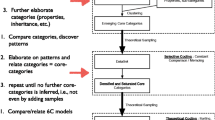Abstract
Learning from experience is the key to successes for all that develop software. Both the successes and the failures in software projects can help us to improve. Here we discuss two versions of Post Mortem Analysis (PMA) as methods for harvesting experience from completed software projects, which can be part of a larger knowledge management program. The two methods are tailored for use in small and medium size companies and are conceptually easy to apply. In addition, they require few resources compared to other methods in the field. We think that the methods are useful for companies when they need to document their knowledge, find improvement actions and as a start of systematic knowledge harvesting.
Access this chapter
Tax calculation will be finalised at checkout
Purchases are for personal use only
Preview
Unable to display preview. Download preview PDF.
Similar content being viewed by others
References
Collier, B.D., Tom, F.P.: A Defined Process For Project Postmortem Review, IEEE Software (July 1996)
Nolan, A.J.: Learning form Success. IEEE Software (January / February 1999)
Cusumano, M.A., Selby, R.W.: Microsoft Secrets. The Free Press (1995) ISBN 0–02–874048–3
Garvin, D.: Building a Learning Organisation. Harvard Business Review (July/August 1993)
Kolb, D.: Management and the learning process. In: Starkey, K. (ed.) How Organizations learn, Thomson Business Press, London (1996)
Straker, D.: A Toolbook for Quality Improvement and Problem Solving. Prentice Hall International (UK) Limited (1995)
Scupin, R.: The KJ Method: A Technique for Analyzing Data Derived from Japanese Ethnology. Human Organization 56(2), 233–237 (1997)
Jørgensen, M., Sjøberg, D.: The Importance of NOT Learning from Experience. Proceedings of the EuroSPI 2000 Conference
van Solingen, R., Berghout, E.: The Goal/Question/Metric Method. McGraw Hill, New York (1999); Japanese Ethnology, Human Organization 56(2) pp. 233–237
Mendoca, M.G., Basili, V.: Validation of an Approach for Improving Existing Measurement Frameworks. IEEE Transactions on Software Engineering 26(6) (2000)
Oivo, M., Birk, A., Komi-Sirviö, S., Kuvaja, P., van Solingen, R.: Establishing Product Process Dependencies in SPI. In: Proceedings of the fourth annual SEPG conference, Amsterdam, The Netherlands, June 7–10 (1999)
Baird, L., Holland, P., Deacon, S.: Learning from Action: Imbedding More Learning into the Performance Fast Enough to Make a Difference. Organizational Dynamics 27(4) (1999)
Author information
Authors and Affiliations
Editor information
Editors and Affiliations
Rights and permissions
Copyright information
© 2003 Springer-Verlag Berlin Heidelberg
About this chapter
Cite this chapter
Stålhane, T., Dingsøyr, T., Hanssen, G.K., Moe, N.B. (2003). Post Mortem – An Assessment of Two Approaches. In: Conradi, R., Wang, A.I. (eds) Empirical Methods and Studies in Software Engineering. Lecture Notes in Computer Science, vol 2765. Springer, Berlin, Heidelberg. https://doi.org/10.1007/978-3-540-45143-3_8
Download citation
DOI: https://doi.org/10.1007/978-3-540-45143-3_8
Publisher Name: Springer, Berlin, Heidelberg
Print ISBN: 978-3-540-40672-3
Online ISBN: 978-3-540-45143-3
eBook Packages: Springer Book Archive




